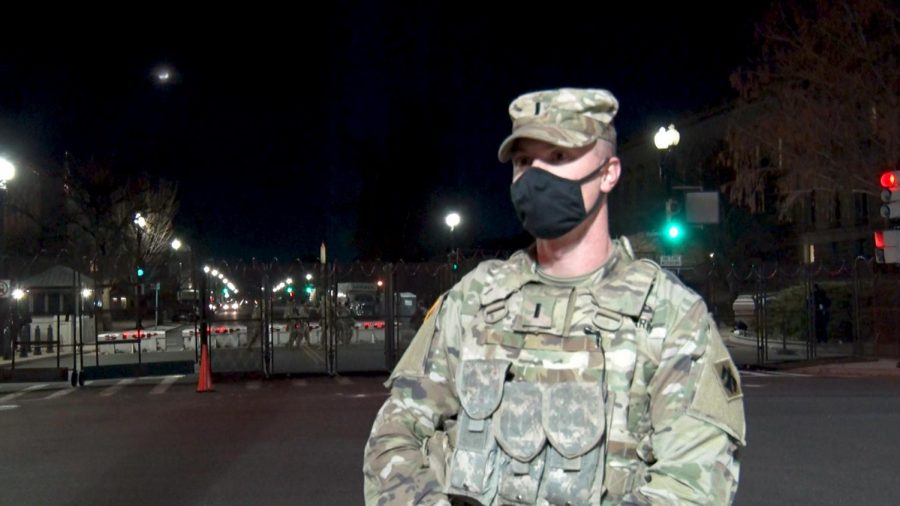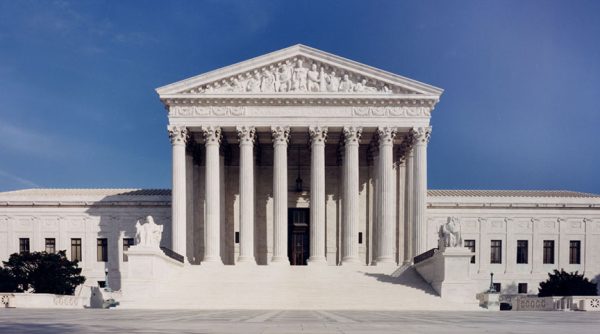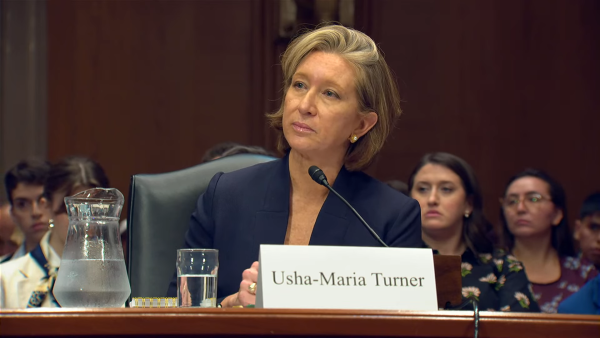Capitol security measures scaled back, lawmakers concerned about National Guard, fencing
Oklahoma National Guard Lieutenant Tomas Meget speaking about Inauguration Day preparations on January 19. (Skylar Tallal/ Gaylord News)
WASHINGTON — Citing decreasing threat levels, the US Capitol Police and House and Senate sergeants-at-arms are pulling back fencing to free up streets and are preparing to decrease the National Guard presence around the Capitol.
For nine weeks, the U.S. Capitol has been surrounded by two perimeters of tall fencing, topped with razor wire. Members of the National Guard also surrounded the Capitol, patrolling each level of fencing. The security measures enacted after the Jan. 6 riots supporting former President Donald Trump have disrupted traffic in the center of Washington and caused anger among city residents and lawmakers, including members of Oklahoma’s delegation.“I think it’s stupid,” Sen. Jim Inhofe said this week.
Guarding the Capitol should not be the National Guard’s job, the Republican senator from Oklahoma said, and the fencing hurts the nation’s global image.
“I don’t like the idea that all around the world they’re looking at pictures of us with barbed wire going around (the Capitol) …” Inhofe said. “It’s the wrong vision of America.”
The current vision, with fencing extending into streets surrounding the Capitol topped with razor wire guarded by the National Guard, is now changing, according to acting House sergeant-at-arms Timothy Blodgett.
“The U.S. Capitol Police has informed the Sergeant at Arms that ‘there does not exist a known, credible threat against Congress or the Capitol Complex that warrants the temporary security fencing,’” Blodgett said in a memo sent to Congress Monday.
As a result, the inner perimeter is being moved closer to the Capitol while the Guard will begin removing the outer perimeter next week.
While that could be seen as good news to those opposed to the measures, the very presence of the fencing and National Guard is a problem for Oklahoma lawmakers.
“People are concerned that the Speaker (of the House) is way over-doing this security of the United States Capitol when she has complete disregard for our country,” said Rep. Kevin Hern, R-Okla., of Tulsa. “And so does the president when it comes to securing our southern border.”
Hern said that the cost of maintaining the perimeter doesn’t justify the security measures.
“(Pelosi and Biden) say it’s senseless to have a secure southern border to protect the sovereignty of this country… Yet it’s OK to have it up here and spend hundreds of millions of dollars on temporary fencing.”
The Defense Department estimates the National Guard’s deployment through May will cost $521 million.
The security measures were put up around the Capitol after then-President Trump supporters broke into the Capitol to prevent the Congressional vote to certify Joe Biden’s electoral college win.
Other members of Congress, including some across the aisle, are also opposed to the current security measures.
The top two members of the House Armed Services Committee, Reps. Adam Smith (D-Wash.) and Mike Rodgers (R- Ala.) issued a joint statement last week decrying the National Guard presence and fencing.
“We are deeply troubled by the current level of security around the United States Capitol,” they said in the statement, before saying they could not ignore the cost of the measures or the effects on the National Guard’s overall readiness.
As the US Capitol Police start to scale back security measures, DC residents have expressed dismay with the fencing, echoed by some Oklahomans.
Del. Eleanor Holmes Norton, the District of Columbia’s nonvoting delegate in Congress, wrote a letter to the Capitol Police Board in February to ask that the razor wire be removed from the fencing.
“The time has surely come to remove the razor wire, which makes our country appear unable to protect its own Capitol unless it is fortified like a prison,” Norton said in the letter.
Inhofe expressed similar views, suggesting that Oklahomans’ patriotism leads them to oppose the fencing because of how it makes the country look.
“With that increased level of patriotism that (Oklahomans) have there, I think they look beyond the borders of Oklahoma, and they’re concerned about what we look like to the rest of the world,” Inhofe said. “I think they’re pretty much in agreement that America is open.”
Gaylord News is a Washington-based reporting project of the University of Oklahoma Gaylord College of Journalism and Mass Communication.







